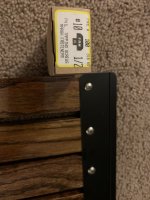Scott Smith
TVWBB Pro
Some of you stainless steel bolters might find this short video interesting if you haven't seen it:
A popular refrain on this forum when rehabbing old grills is to "replace the bolts with stainless ones"
WAY over my headStainless steel can be a pita at times. We would use coriolis mass liquid flow meters in a controlled flow loop of Ammonium Chloride. The meters were stainless steel due the corrosion issue with the Ammonium Chloride. BUT, when energized by 30 kHz mechanism in the flow meter, stainless steel becomes brittle. We ended up using hastelloy meters instead.
Actually by using SS I guess the danger is you CAN get it apart LOL. Interesting tidbit. On both my Z Grill and my Member's Mark all the screws are anodized stainless steel. What's nice is it makes it a snap to get things apart if ya need to service anythingI think "the dangers of stainless steel bolts" is a bit dramatic as it applies to an outdoor grill, don't you? What's the worst that can happen?It galls and you can't get it apart?
And if you don't know what you're doing, then don't do it, right?
That sounds like...... a rather hostile environment. 30 kHz? I'm assuming acoustic. Hydrogen embrittlement?in a controlled flow loop of Ammonium Chloride
Well..... there's a little bit o' truth there.....He then told me the broken lever was the engine's fault (a Cummins 6BT).
Actually the chloride ion. I'll PM you with more info.That sounds like...... a rather hostile environment. 30 kHz? I'm assuming acoustic. Hydrogen embrittlement?
I agree that stainless screws, nuts and bolts may not make your grill last enough longer for any of us to see the difference. However, I can't tell you how many wood slat tray tables I have picked up where the screws on the bottom are a rusted mess. That rust can make its way to the frame besides looking trashy. I am sold on marine grade 316 stainless screws for this application:I just replace the bolts Weber used with the same material bolts on the old east west burner grills. If they held up for 20 plus years new bolts will probably last another 20. I don’t see any benefit to replacing every frame bolt with stainless from a structural standpoint.
The one cosmetic use of stainless fasteners that looks good is on the old lid endcaps that originally used a carriage type bolt.

